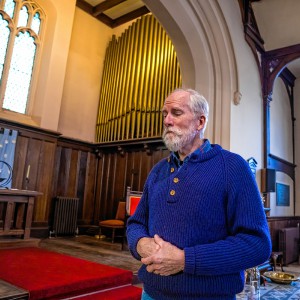In Franklin, city and residents grapple with homelessness
| Published: 03-09-2019 8:13 PM |
When it comes to homelessness, the city of Franklin is experiencing growing pains similar to what Concord once felt.
And, more than anyone else, Desiree McLaughlin is absorbing the blows and shouting from the city’s rooftops, trying to draw attention to a problem that directly affects her life and livelihood.
She owns a 24-hour laundromat in the heart of Franklin. She lives upstairs. Add winter to the formula, and this is a perfect storm, a tornado of trouble whirling around her like a spin cycle.
McLaughlin’s all-night business draws the homeless. Some of them are peaceful, simply seeking warmth. Others, though, want stuff, like money or a cell phone to make a late-night call. Still others might be belligerent.
That’s when McLaughlin’s night manager calls, usually around 1:30 a.m. McLaughlin calls it the “Witching Hour,” the time when she slides into her slippers and heads downstairs in her pajamas.
From there, guidelines don’t exist. Some of the homeless can stay, thanks to an owner with a heart. Some must leave, their behavior a problem. As mobsters in The Godfather liked to say, “It’s business, not personal.”
“I’ve been dubbed the homeless lady,” McLaughlin told me recently. “I’ve also been called the lady from the laundromat. That’s fine. I don’t mind.”
Those labels come from city officials – the police and city government – who have heard McLaughlin’s complaints, because she has more to complain about than anyone else.
Article continues after...
Yesterday's Most Read Articles
Plus, she sees what’s happened 10 miles south. In Concord.
“I think (Franklin) could do a better job,” McLaughlin said. “I think the city could do better. When I was looking at articles about this, I was upset because I learned Concord has formed a steering committee to address this very issue. They have a statement and a document defining what could have been written for Franklin.”
In Concord, McLaughlin sees money from the sale of tax credits and the New Hampshire Housing Finance Authority, which does not require repayment. She sees city, county and state funding, grants, public donations, sponsorships from local businesses.
She sees institutions called the Concord Coalition to End Homelessness, Housing First, the Friendly Kitchen, the American Friends Service Committee, the Concord Rotary Club. She sees an emergency winter shelter and assistance from local churches that have doubled as shelters, and a resource center that summarizes everything into a nice, neat little package.
“A lot of people say they don’t want our tax dollars to go up,” McLaughlin said. “But in this steering committee in Concord, it says there’s support for the work, the New Hampshire Charitable Foundation, the American Friends Service. That doesn’t sound like taxpayer dollars to me.”
There’s a spirit in Concord as well, an annual tribute in front of the State House to honor the homeless who have died over the preceding 12 months.
But there’s been struggle, too. Police have shooed the homeless from their camps by the river, a church closed its winter shelter with no end to the problem in sight, people died. Acknowledging that struggle is what charged the drive for action.
McLaughlin hopes you won’t judge her too harshly. She knows that through social media, the press, and her visits to the police and city hall, people have her on their radar, sometimes seeing her as a pain in the butt.
But all she cares about is making enough noise to nudge the issue above ground, and hopefully, people will care enough to help take action.
Judy Milner, the city manager, was under the impression that she and McLaughlin had worked well together recently, and was unaware she was upset, telling me, “I’m a little taken aback by that. I recently met with her about the homeless, within a month ago. We talked about what we should do. We talked about her sending them to city hall for services. We had good conversations.”
The city’s police department is another matter. McLaughlin says she recently phoned there late at night, after the laundromat’s night manager had called to say she needed to put on her slippers and come down.
There was a homeless person there. There was a problem.
McLaughlin says an officer told her he couldn’t come to the laundromat at that moment. Too busy. There were other priorities.
She says filing a trespassing report was harder than it should have been, as was learning about police protocol.
“Very angry at this point,” McLaughlin said. “I have a long fuse, but this back and forth was a little disconcerting.”
Police Chief Dave Goldstein said there’s only so much the police department can do.
“She has gone on social media and saying we are not doing our jobs,” he said. “We’ve worked hard and apparently, she is dissatisfied. I’ve always had an open door, and I have yet to see her here.”
Goldstein mentioned small budgets and personnel shortages. His department fields more than 61,000 calls per year, he told me. His officers have good relations with homeless people. They know some by name. They’re trying. The problem plagues the country. It’s hard to solve.
After talking to the players involved here, it’s obvious Franklin is dealing with an issue that has no easy solution. Law enforcement, city government personnel and a local businesswoman are showing their frustration.
Recently, the Franklin Congregational Church donated 25 “Blessing Bags,” filled with protein-rich food, snacks, Kleenex, hand warmers. The bags were dropped off at McLaughlin’s business.
After a Franklin officer stopped by, he and McLaughlin split the bags and separately drove them to the police station, where Goldstein was waiting. He offered to take the responsibility of distributing the bags.
McLaughlin, Goldstein and Sgt. Dan Poirier then posed for a photo, with some of the bags shown on the hood of a Franklin cruiser. The picture was posted on Facebook, on the Franklin Police Department page.
McLaughlin said she was grateful for the help, but hoped the scene reflected genuine concern, rather than a public-relations campaign.
“Why couldn’t someone start a steering committee to communicate with (the homeless),” McLaughlin said. “Just bring it up the road from Concord. What is it, 13, 14 miles away?”
]]>







 What to know about the plan to allow students to attend any public school in the state
What to know about the plan to allow students to attend any public school in the state A Franklin congregation loves its 19th-century home. Insurance woes could spell its decline.
A Franklin congregation loves its 19th-century home. Insurance woes could spell its decline.  Bow police to purchase drone for improving public safety
Bow police to purchase drone for improving public safety
